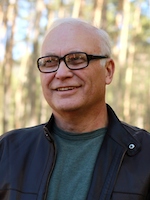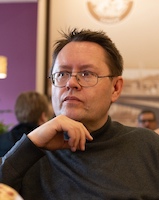The spatial image of Tuva in the focus of sociocultural phenomenology
DOI:
https://doi.org/10.25178/nit.2019.3.1Keywords:
sociocultural phenomenology; spatial development; space; spatial turn; sociocultural identity; ethnic culture; Tuva; non-contact culture; local culture; medial culture; limitrophe statesAbstract
The article examines possible identifications of ‘spatial development’ as a discipline, offering its interpretation and explaining its heuristic potentional by analyzing the spatial image of Tuva. It also offers a philosophy of spatial development, which is interpreted as the development of the object, including its qualitative transformation (via either complication or simplification) of its internal and external space.
Analyzing Tuva from the point of view of its spatial status allows us to define it as an integral unit with its own internal structure and identity. It can be defined as a sociocultural subject, i.e. an individuated unity of the territory, population and its sociocultural character.
According to the criterion of contact/non-contact spatial culture, Tuva can be seen as a ‘non-contact’ culture. Its shift towards greater contactness is due to a number of reasons, including demographic growth, transport and industry-related land development, transition to a sedentary lifestyle, urbanization, and the expansion of interregional and international relations. According to the criterion of local/mainstream culture, Tuva is a local culture. It has been maintaining its cultural authenticity and focusing on cooperation with all neighboring cultures (such as Russian, Mongolian and Chinese). The interaction with these cultures did not lead to the spread of the Tuvans over vast territories. This is the sign that Tuvan culture is of a median type, which is focused on itself. The border position of Tuva between Russia and China gives reason to define it as a kind of frontier territory, or a limitrophe.
References
Anaiban, Z. V. (2011) Kharakteristika etnodemograficheskikh protsessov Tuvy v sovetskii period [Characteristics of ethnodemographic processes in Tuva during the Soviet period]. The New Research of Tuva, no № 2-3 [online] Available at: https://nit.tuva.asia/nit/article/view/412 (access date: 24.02.2019). (In Russ.).
Ahiezer, A. S. (1998) Rossiia: kritika istoricheskogo opyta: sotsio-kul'turnaia dinamika Rossii. [Russia: critique of historical experience: sociocultural dynamics of Russia]. Novosibirsk, Sibirskii hronograf. Vol. I: Ot proshlogo k budushhemu [From the past to the future]. 804 p. (In Russ.).
Golovkov, A. N. (2011) Prostranstvennoe razvitie kak ekonomicheskaia kategoria. Management of economic systems, no. 2 (26) [online] Available at: http://uecs.ru/uecs-26-262010/item/325-2011-03-25-11-33-26 (access date: 24.02.2019). (In Russ.).
Golovnev, A. V. (2009) Antropologiia dvizheniia [Anthropology of Motion]. Ekaterinburg, UrO RAN; Volot. 496 p. (In Russ.).
Golovnev, A. V. (2012) Lokal'nye i magistral'nye kul'tury Severnoi Evrazii [Local and mainstream cultures of Northern Eurasia]. In: Chelovek i Sever: antropologiia, arkheologiia, ekologiia [Man and the North: anthropology, archeology, ecology]. Ed. by A. N. Bagashev. Iss. 2. Tjumen', IPOS SO RAN. 425 p. Pp. 234–237. (In Russ.).
Datsyshen, V. G. (2014) Saianskii rubezh. Yuzhnaia chast' Prieniseiskogo kraia i russko-tuvinskie otnosheniia v 1616-1911 gg. [The Sayan frontier. The southern part of the Yenisei region and Russian-Tuvan relations in 1616-1911]. Moscow, Direkt-Media. 309 p. (In Russ.).
Kriukov, V. A. (2016) Arteriia ili matritsa? [An artery or a matrix?]. ECO, no. 5, pp. 2-4. (In Russ.).
Lazhentsev, V. N. (2013) Territorial'noe razvitie kak ekonomiko-geograficheskaia deiatel'nost' (teoriia, metodologiia, praktika) [Territorial development as economic and geographical activity (theory, methodology, practice)]. Regional economy, no 1, pp. 10–20. (In Russ.).
Lamazhaa, Ch. K. (2011) Arkhaizatsiia obshchestva v period sotsial'nykh transformatsii [The Archaization of Society in the Period of Social Transformations]. Znanie. Ponimanie. Umenie, no. 3, pp. 35–42. (In Russ.).
Lamazhaa, Ch. K. (2014) Tuva i Rossiia: 100 let vmeste [Tuva and Russia: 100 years united]. The New Research of Tuva, no. 3 [online] Available at: https://nit.tuva.asia/nit/article/view/127 (access date: 24.02.2019). (In Russ.).
Potanin, G. N. (2002) Ocherki Severo-Zapadnoi Mongolii. Vypusk 2 [Essays on the North-Western Mongolia. Issue 2]. In: Traditsionnaia kul'tura tuvintsev glazami inostrantsev (konets XIX — nachalo XX veka) [Traditional culture of Tuvans through the eyes of foreigners (late 19th — early 20th centuries)] / Preparation of texts, preface and comments by A. K. Kuzhuget. Kyzyl, Tuvan book publisher. 225 p. Pp. 18–23. (In Russ.).
Prokof'eva, E. D. (2011) Protsess natsional'noi konsolidatsii tuvintsev [The process of national consolidation of the Tuvans]. St. Petersburg, Nauka. 538 p. (In Russ.).
Rumyantsev, O. K. (2018) Prostranstvennyi povorot: otnoshenie etnosa i natsii kak analogiia otnosheniia prostranstvennogo i vremennogo modusa sub’ektivnosti cheloveka [The spatial turn: the relation of the ethnos and the nation as an analogy of the relation of spatial and temporal mode of human subjectivit]. In: Tselevye orientiry gosudarstvennoi natsional'noi politiki: vozobnovlenie chelovecheskogo resursa i natsional'nye kul'tury: problema Drugogo [Targets of the state national policy: the renewal of human resource and national cultures: the problem of the Other]. Ed. by O. K. Rumyantsev and A. Iu. Shemanov. St. Petersburg, Aletheia. 358 p. Pp. 137–159. (In Russ.).
Sorokin, P. A. (1992) Chelovek. Civilizatsiia. Obschestvo [Man. Civilization. Society]. Moscow, Politizdat. 543 p. (In Russ.).
Sorokin, P. A. (2005) Sotsiologiia revoliutsii [Sociology of revolution]. Moscow, ROSSPEN. 704 p. (In Russ.).
Tarbastaeva, I. S. (2014) Altai i Tuva: Krasavitsa i dikarka [Altai and Tuva: the beauty and the savage]. The New Research of Tuva, no 1 [online] Available at: https://nit.tuva.asia/nit/article/view/192 (access date: 24.02.2019). (In Russ.).
Fofanov, V. P. (1986) Kategoriia «otdelnoe» i status gumanitarnykh nauk [The category of “individual” and the status of the humanities]. In: Problemy gumanitarnogo poznaniia [Problems of humanitarian knowledge] / Ed. by A. N. Kochergin and V. P. Fofanov. Novosibirsk, Nauka. 335 p. Pp. 318–332. (In Russ.).
Hatuntsev, S. V. (2011) Limitrofy — mezhtsivilizatsionnye prostranstva Starogo i Novogo sveta [Limitrophes, the intercivilizational expanses of the Old and New worlds]. Polis. Political Studies, no. 2, pp. 86–98. (In Russ.).
Yakovenko, I. G. (2006) Riski sotsial'noi transformatsii rossiiskogo obschestva: kul'turologicheskii aspekt [Risks of social transformation of Russian society: the cultural aspect]. Moscow, Progress-Traditsiia. 176 p. (In Russ.).
Hall, E. T. (1990) The hidden dimension. New York: Doubleday. 217 p.
Smith, A. D. (1986) The ethnic origins of nations. Oxford: Blackwell. 329 p.
Smith, A. D. (2003) The politics of culture: ethnicity and nationalism. In: Companion encyclopedia of anthropology: Humanity, culture and social life / Ed. by T. Ingold. London, New York, Routledge. 1127 p. P. 706–734.
The spatial turn: Interdisciplinary perspectives (2008) / Ed. by B. Warf and S. Arias. New York, Routledge. 232 p.
Published
How to Cite
Popkov Yu. V. and Tyugashev E. A. The spatial image of Tuva in the focus of sociocultural phenomenology. The New Research of Tuva. 2019, no. 3. URL: https://nit.tuva.asia/nit/article/view/860 (access date ... ). DOI: 10.25178/nit.2019.3.1
Issue
Section

Author(s) license holder(s) grant rights for their work to the journal (grantee of a license) under the simple non-exclusive open license in accordance with Art. 1286.1 «Open license for a research work, work of literature or fine arts», Civil Code of the Russian Federation.
New Research of Tuva publishes articles under the Creative Commons Attribution-NonCommercial license (CC BY-NC).
Since it is an open license, author(s) reserve the right to upload the article to their institutional repository, submit it to another journal (if it allows republications), or republish it on their own website (in full, or in part).
However, several conditions apply here:
a) The republished version must always contain the name(s) and affiliation(s) of the author(s), the original title and the hyperlink to the original version on the New Research of Tuva website;
b) It must be in open access, free of charge, and no category of readers must be in any way whatsoever advantaged over general readership.
c) should the contribution be submitted elsewhere by its author(s) without substantial modification (30% or more of original text unchanged), the body of the article should contain a disclaimer that the original version was published in New Research of Tuva (with a link to the respective page)
The CC-BY-NC is a non-revocable license which applies worldwide and lasts for the duration of the work’s copyright.










